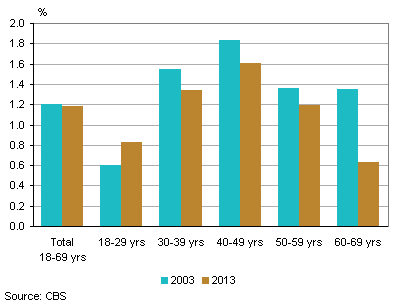More old-age pensioners, but the number who are living together with their adult children remains stable

The number of over-40s with at least one parent still alive has risen tremendously over the past decade. Despite the increase, the number of households where adult children are living together with their parents has not grown.
1.8 million over-40s have both parents still alive
In 2013, more than 1.8 million over-40s had both parents still alive, i.e. an increase by 50 percent relative to a decade ago. The proportion of people aged between 50 and 60, whose parents are both still alive grew from 234 thousand (11 percent) to 410 thousand (17 percent). Last year, the mothers of 16 percent of all people in their sixties (312 thousand) were still alive, versus 14 percent (200 thousand) ten years ago.
Number of adult children with living parent(s) by age of the child

Number of adult children living under the same roof with (one of their) their parents stable
In 2013, 182 thousand old-age pensioners were living together with one or more of their adult children. Although the number of middle-aged people with one or both parents still alive is continually growing, the number sharing a house with their parents has remained fairly stable over the years. Usually, parents share a household with one adult child. Sharing a house can be a solution, if one of the household members - child or parent - requires extra care.
Adult children and parents living in one house is a relatively rare phenomenon
Adult children sharing a home with one or both parents remains a relatively rare phenomenon. For example, only .1.3 percent of adult children aged between 30 and 40 whose parents are both still alive live under the same roof with them. Across all age groups, children sharing a house with their over-65 parents has diminished during the past decade with the exception of young adults (aged between 18 and 30); in this age category, the proportion rose marginally from 0.6 to 0.8 percent.
Share of adult children with living parent(s) (all ages) sharing a house with their over-65 parents by age of the child, 2013

Often for a long period of time
For more than half of households where children and their elderly parents are living together, this situation has lasted at least 18 years, since the municipal population database was set up in 1995. Sons much more often than daughters live together with their parents and the number of disabled among them is just above average.
It is alright to help one’s parents, but not to take them in
In the Family Formation Survey conducted by Statistics Netherlands, respondents are asked whether they think parents and children should help one another. The survey shows that half of the Dutch population think that adult children should care for their parents. On the other hand, only one in ten think that children should take their parents in.
Ruben van Gaalen and Ingeborg Deerenberg